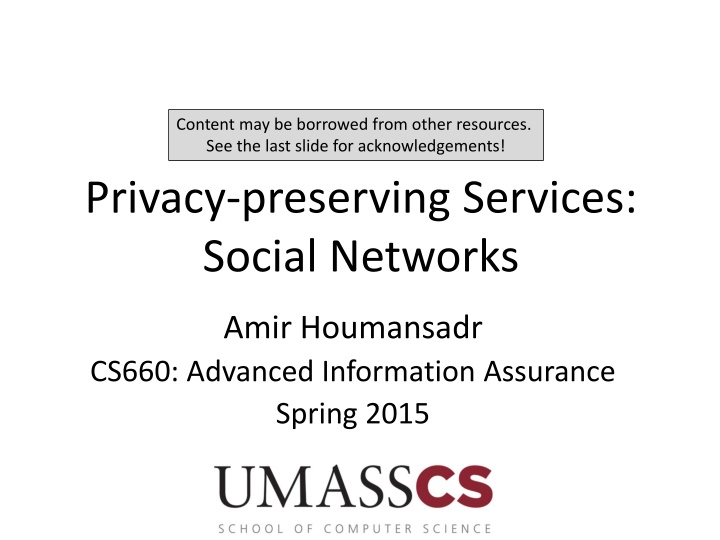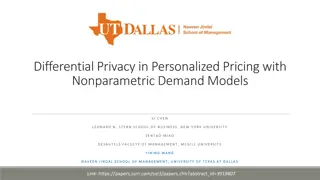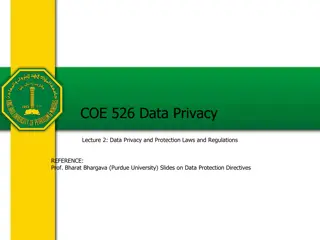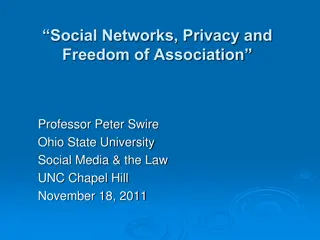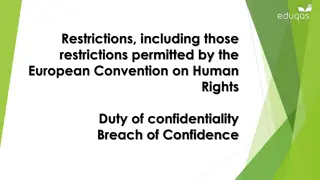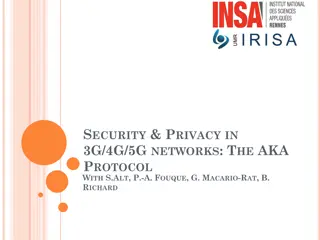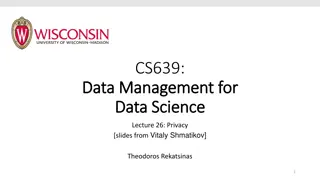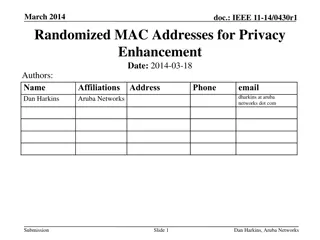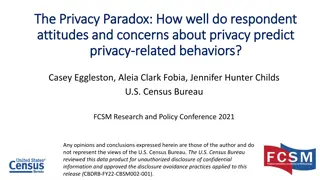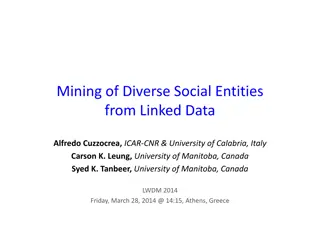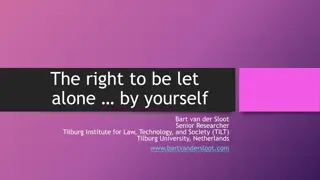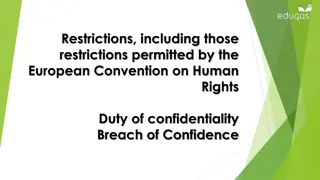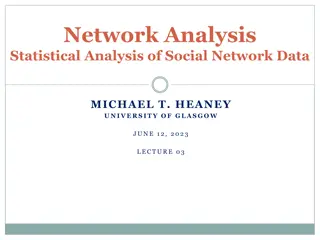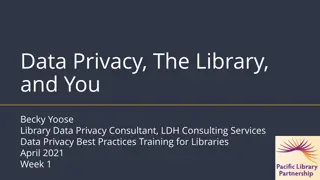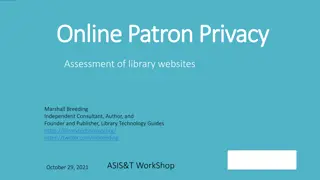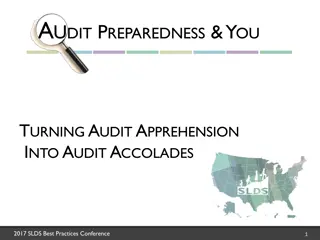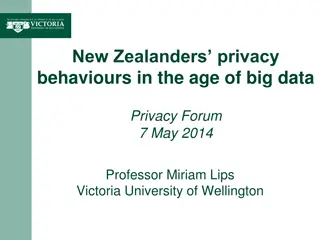Privacy Challenges in Online Social Networks
Online Social Networks (OSNs) like Facebook, Twitter, and LinkedIn have gained immense popularity with millions of users worldwide. However, these platforms present significant privacy issues, from protecting user data against unwanted exposure to the leakage of sensitive information. Challenges include safeguarding data from other users, determining rights to use user data, and pressure from various entities to access and share personal information. Moreover, privacy leakage instances on OSNs can have severe consequences, as information posted publicly can be exploited by employers, insurers, and others for screening purposes. Understanding and addressing these privacy challenges are crucial in today's digital age.
Download Presentation

Please find below an Image/Link to download the presentation.
The content on the website is provided AS IS for your information and personal use only. It may not be sold, licensed, or shared on other websites without obtaining consent from the author.If you encounter any issues during the download, it is possible that the publisher has removed the file from their server.
You are allowed to download the files provided on this website for personal or commercial use, subject to the condition that they are used lawfully. All files are the property of their respective owners.
The content on the website is provided AS IS for your information and personal use only. It may not be sold, licensed, or shared on other websites without obtaining consent from the author.
E N D
Presentation Transcript
Content may be borrowed from other resources. See the last slide for acknowledgements! Privacy-preserving Services: Social Networks Amir Houmansadr CS660: Advanced Information Assurance Spring 2015
Online Social Networks (OSN) Online Web services connecting people to socialize Find friends, make friends Follow celebrities and companies Join groups Share photos, videos Communicate via messages, live chats Etc.
CS660 - Advanced Information Assurance - UMassAmherst 3
OSN Popularity Over 900 million Facebook users worldwide Over 150 million in U.S. Over 450 million access via mobile 300 million pictures uploaded to Facebook daily Over 140 million Twitter users; over 340 million Tweets sent daily Over 175 million LinkedIn members in over 200 countries Statistics from 2012
Privacy Issues in OSNs CS660 - Advanced Information Assurance - UMassAmherst 5
Challenges of Privacy in OSNs Protect user data from: Other users/people Friends, FOF, general public Protection provided by most OSNs Applications Right to use user data? What data? OSN providers Benefit in examining and sharing Pressure from censors
Privacy leakage instances Information posted on OSNs is generally public Unless you set privacy settings appropriately I ll be on vacation post plus geolocation invites burglars, i.e., Please Rob Me Indiscreet posts can lead to nasty consequences
Privacy leakage instances Employers, insurers, college admissions officers, et al. already screen applicants using OSNs Recent report from Novarica, research consultancy for finance and insurance industries: We can now collect information on buying behaviors, geospatial and location information, social media and Internet usage, and more Our electronic trails have been digitized, formatted, standardized, analyzed and modeled, and are up for sale. As intimidating as this may sound to the individual, it is a great opportunity for businesses to use this data.
Privacy leakage instances Posts that got people fired: Connor Riley: Cisco just offered me a job! Now I have to weigh the utility of a [big] paycheck against the daily commute to San Jose and hating the work. Tania Dickinson: compared her job at New Zealand development agency to expensive paperweight Virgin Atlantic flight attendants who mentioned engines replaced 4 times/year, cabins with cockroaches Recent pizza girl got fired before starting the first day!
Privacy leakage instances OSNs don t exactly safeguard posted info Facebook You hereby grant Facebook an irrevocable, perpetual, non-exclusive, transferable, fully paid, worldwide license (with the right to sublicense) to (a) use, copy, publish, stream, store, retain, publicly perform or display, transmit, scan, reformat, modify, edit, frame, translate, excerpt, adapt, create derivative works and distribute (through multiple tiers), any User Content you (i) Post on or in connection with the Facebook Service or the promotion thereof subject only to your privacy settings or (ii) enable a user to Post, including by offering a Share Link on your website and (b) to use your name, likeness and image for any purpose, including commercial or advertising, each of (a) and (b) on or in connection with the Facebook Service or the promotion thereof. You may remove your User Content from the Site at any time. If you choose to remove your User Content, the license granted above will LinkedIn Additionally, you grant LinkedIn a nonexclusive, irrevocable, worldwide, perpetual, unlimited, assignable, sublicenseable, fully paid up and royalty- free right to us to copy, prepare derivative works of, improve, distribute, publish, remove, retain, add, process, analyze, use and commercialize, in any way now known or in the future discovered, any information you provide, directly or indirectly to LinkedIn, including but not limited to any user generated content, ideas, concepts, techniques or data to the services, you submit to LinkedIn, without any further consent, notice and/or compensation to you or to any third parties. Any information you submit to us is at your own risk of loss. automatically expire, however you acknowledge that the Company may retain archived copies of your User Content.
Privacy-preserving OSNs: Decentralized Systems CS660 - Advanced Information Assurance - UMassAmherst 11
Persona Decentralized structure Encrypt by group without many copies Precise Group control mechanism Groups created by one user should be available for use, both in enc/dec by friends Can be added onto existing applications
Group Key Management Data is encrypted with attribute-based encryption, any user could retrieve the data, but can decrypt it only if he s a member of the group. Each Persona user is identified by a single public key, and stores their encrypted data in storage service. Users exchange public key and storage locations out of band
Revocation Removing a member requires re-keying Data encrypted with old key stays visible to revoked member
EASiER Encryption-based Access Control in Social Networks with Efficient Revocation Using a minimal trusted proxy in decryption Enforce revocation constraints Proxy cannot perform decryption or grant access
Frientegrity See Slides Here CS660 - Advanced Information Assurance - UMassAmherst 17
Acknowledgement Some of the slides, content, or pictures are borrowed from the following resources, and some pictures are obtained through Google search without being referenced below: Adam C. Champion and Dong Xuan, Social Networking Security Dan Zhang s presentation at CS691 CS660 - Advanced Information Assurance - UMassAmherst 18
